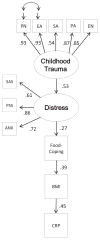From childhood trauma to elevated C-reactive protein in adulthood: the role of anxiety and emotional eating
- PMID: 24933013
- PMCID: PMC5660872
- DOI: 10.1097/PSY.0000000000000072
From childhood trauma to elevated C-reactive protein in adulthood: the role of anxiety and emotional eating
Abstract
Objective: Childhood trauma is known to be related to inflammatory processes in adulthood, but underlying psychological/behavioral mechanisms have not been fully characterized. To investigate associations between childhood trauma and inflammation (indexed by C-reactive protein [CRP]), we used a structural equation modeling approach on a subsample of the Midlife in the United States biomarker project.
Methods: Participants included 687 men and women without history of cancer, diabetes, cardiovascular disease, or stroke who completed a physical examination and extensive questionnaires and provided blood. To test for sex differences, we held as many parameters invariant across sexes as possible while still retaining good model fit.
Results: Tests of direct and indirect effects revealed that childhood trauma was significantly associated with elevated CRP, via elevated body mass index (BMI; p < .001). This relationship was mediated by a broad latent measure of distress, which was associated with using food as a coping mechanism. Men and women differed in reported levels of physical abuse, sexual abuse, and physical neglect. Compared with men, women showed a stronger association between BMI and CRP, whereas men had a stronger association between use of food to cope and elevated BMI.
Conclusions: Our results are consistent with a model in which childhood trauma is associated with elevated CRP, a relationship associated with stress reactivity and compensatory emotional eating. Men and women may experience trauma in qualitatively distinct patterns but share many vulnerabilities, which can lead to elevated health risks. Emotional eating may be an important target for intervention in this population.
Conflict of interest statement
Conflicts of Interest: The authors have no conflicts of interest.
Figures



References
-
- Felitti VJ, Anda RF, Nordenberg D, Williamson DF, Spitz AM, Edwards V, Koss MP, Marks JS. Relationship of childhood abuse and household dysfunction to many of the leading causes of death in adults. The Adverse Childhood Experiences (ACE) Study. Am J Prev Med. 1998;14:245–58. - PubMed
-
- Center for Disease Control; Adverse Childhood Experiences (ACE) Study. Data and Statistics: Prevalence of Individual Adverse Childhood Experiences. 2013 Retrieved 07/2013 from http://www.cdc.gov/ace/prevalence.htm.
Publication types
MeSH terms
Substances
Grants and funding
LinkOut - more resources
Full Text Sources
Other Literature Sources
Medical
Research Materials
Miscellaneous

